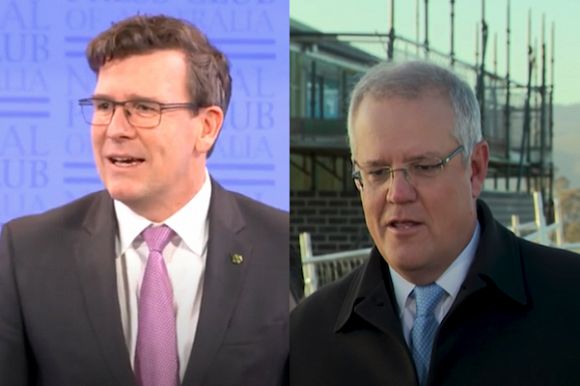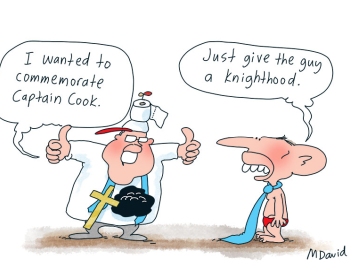Australia isn't for its people but for plutocrats: for the billionaires, the coal barons, the media oligarchs and the corrupt politicians who represent them.
It doesn’t have to be this way.
At first, the answer is simple. Straya’s for Strayans, and who still says whom anyway?
For whom does Australia exist?
Not for the 500 nations of Aboriginal people living on “nobody’s land” as the First Fleet arrived at Botany Bay. Not for a 60,000-year-old culture that fought a colonial onslaught which decimated a population of about 750,000. Not for the one in three Indigenous kids taken from their families between 1910 and 1970, nor for the second generation stolen between the apology of 2008 and the reality of 2020.
Not for the more than 430 Aboriginal people who have died in custody since the 1991 Royal Commission, nor for the families of TJ Hickey, Ms Dhu and David Dungay Junior. Not for Aboriginal sports stars booed for taking too much pride in their heritage, and certainly not for anyone demanding “voice, treaty, truth”.
Not for many of those who’ve come across the seas to live in an “Australia for the White Man”, official policy until the 1970s and unofficial doctrine ever since. Not for Asian immigrants targeted in John Howard’s One Australia policy of the 1980s and Hanson’s One Nation Party of the 1990s. Not for the 600,000 Muslims across the nation, public enemy number one in a two-decade media and government war on Islam.
Not for refugees, because:
“We will decide who comes to this country and the circumstances in which they come.”
Not for Reza Barati, murdered during Manus Island riots in February 2014, nor for the children of the Nauru files whose stories of assault, sexual abuse and self-harm were dismissed as “hype". Not for those whose human rights are nothing compared to the promise of a more generous parliamentary pension.
Not for its workers, whose share of GDP sank from 58% in 1975 to 47% in 2018. Not for those experiencing what the Reserve Bank governor described as a “crisis of low pay”, still trapped in poverty despite earning a full-time minimum wage.
Not for the underemployed, with rates among the worst in the OECD, nor for the large temporary visa workforce enduring unsafe conditions and below minimum wage pay. Not for those fighting these declining conditions in a nation where union membership has fallen from above 50% of the workforce in the 1970s, to around 15% today. Not for the poor and unemployed, lifted above and then dumped below the poverty line in their millions as pawns of pandemic politics.
This country isn’t so much for its people at all. So, for whom does Australia exist?
For the 200 richest individuals and families, enjoying a 66-fold wealth increase in the last 36 years and whose combined fortune has soared $82 billion over the past twelve months, to a total of $424 billion. For the 104 billionaires, up from 91 in 2019.
For the property tycoons, now amassing wealth of $81.56 billion, just as an October 2020 Foodbank report showed food relief requests had risen 47% since the pandemic began. For the newly minted tech billionaires like Mike Cannon-Brookes, who owns the only $100 million house in Australia, a fun fact for the 100,000 homeless Australians.
For fossil fuel companies, whose money floods our political system, whose lobbyists crowd the corridors of power, and whose former representatives now staff the Prime Minister’s office. For the two richest Australians, mining magnates Gina Rinehart and Andrew Forrest, who have doubled their money over the past year to a combined total of $52 billion. For mining tycoon Clive Palmer, who spent $83 million spreading misinformation which may have cost Labor the 2019 federal election, since punished by a fortune which has risen from four to nine billion.
For media oligarchs like Rupert Murdoch, amassing $18 billion purely through grit, determination, climate denial, misogyny and race hate. For his monopolistic ambitions, which have helped create the third-most concentrated media market in the world behind Egypt and China. For News Corp, which regularly avoids paying any corporate tax on billions in revenue.
For big business, taking the lion’s share of $400 billion in subsidies, incentives and cheap loans received since March 2020. For the banks, insurance companies, hedge funds and other financial institutions which between 2005 and 2010 alone increased their asset value from $3 trillion to $4.6 trillion, or 340% of GDP.
For these institutions who have since been exposed by a Royal Commission for charging the dead, deliberately misleading regulators, and pushing dodgy financial advice and insurance products, yet continue to lobby successfully against meaningful reform.
For the major party politicians who have capitulated to the corporate takeover of our democracy. For the Prime Minister paid half a million dollars a year to fuel the fires of climate destruction and for the Opposition Leader paid $390,000 for failing to oppose him. For those whose corruption grows more pungent by the hour, and for those whose daily failure to call it out reeks just as much.
But, for whom could Australia exist?
How about a Straya for Strayans?
Not just for the 200 richest gaming the system in their favour, whose wealth belongs to all of us and should be taxed accordingly. Not just for the fossil fuel companies polluting our politics and poisoning our planet, and which should be held responsible. Not just for media oligarchs profiting from lies and division, whose power should be dissolved to the people.
Not just for big business privatising social wealth, not just for finance sharks in a feeding frenzy, not just for CEOs whose self-valuation at 180 times the ordinary worker surely has all the hallmarks of a forever cocaine binge. Not just for corrupt politicians and their spineless colleagues, who serve their donors far better than their constituents.
But for the First Australians, whose 232-year justice struggle continues with almighty strength, resilience, and dignity. For Charlie Perkins and the freedom riders of the 1960s, for those who pitched the tent embassy in the name of land rights, for Eddie Mabo and his defeat of terra nullius, for the indomitable spirit of resistance which drives the Black Lives Matter and Djab Warrang activists of today.
For migrants and refugees who, far from occupying our welfare queues while also stealing our jobs, are some of the greatest contributors to Australian society. For Behrouz Boochani, who texts a bestselling, award-winning book from prison but is denied residency. Certainly more than for Peter Dutton, who can’t even text his misogyny to the right contact, yet somehow retains his.
For its workers, whose unions have given us everything from annual leave to awards and penalty rates to meal breaks. For the shelf stackers, nurses and schoolteachers, whose pandemic efforts have made Scott Cam look somewhat less than essential. For the low wage earner and the casual, for workers in unsafe conditions and for those just made redundant, all of whom deserve a high-wage jobs guarantee far more than Gina Rinehart, Andrew Forrest and Clive Palmer deserve their multi-billion-dollar pandemic pay rise.
For all Australians who, like every other human being on the planet, deserve the high-quality, publicly-funded education, healthcare, housing, transport, and other services of a decarbonised economy which is embedded within a thriving natural world as we all live rich, meaningful, dignified and fulfilling lives.
For the Australian people, not just for the Australian plutocracy.
So, for whom does Australia exist? As it turns out, Straya’s not for strayans, but it bloody well should be.
Liam McLoughlin is a teacher and writer who publishes satire and analysis at Situation Theatre.
A longer version of this piece was already published here.
Related Articles
 This work is licensed under a Creative Commons Attribution-NonCommercial-NoDerivs 3.0 Australia License
This work is licensed under a Creative Commons Attribution-NonCommercial-NoDerivs 3.0 Australia License
Support independent journalism Subscribe to IA.













